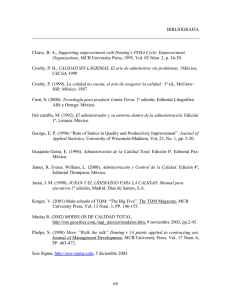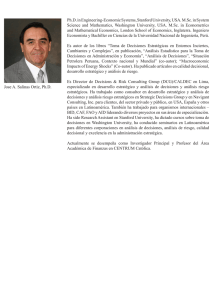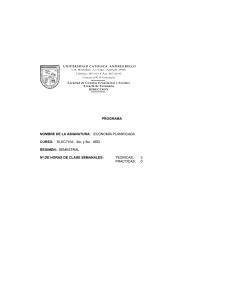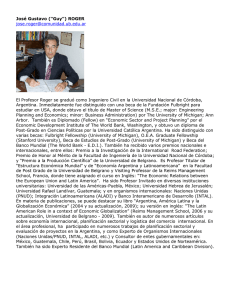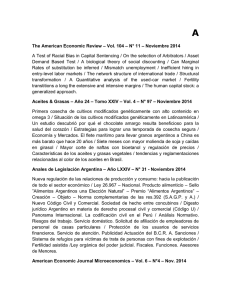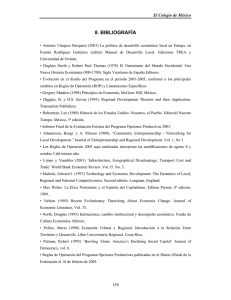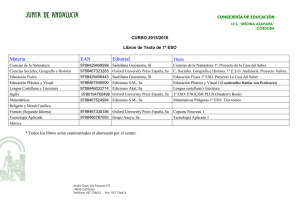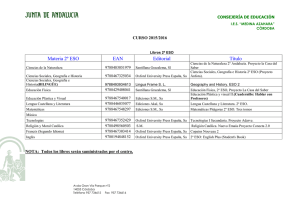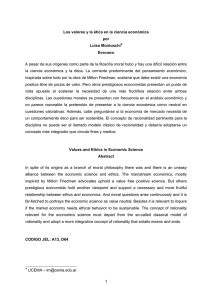Filosofía de la Economía - Universidad Católica Argentina
Anuncio
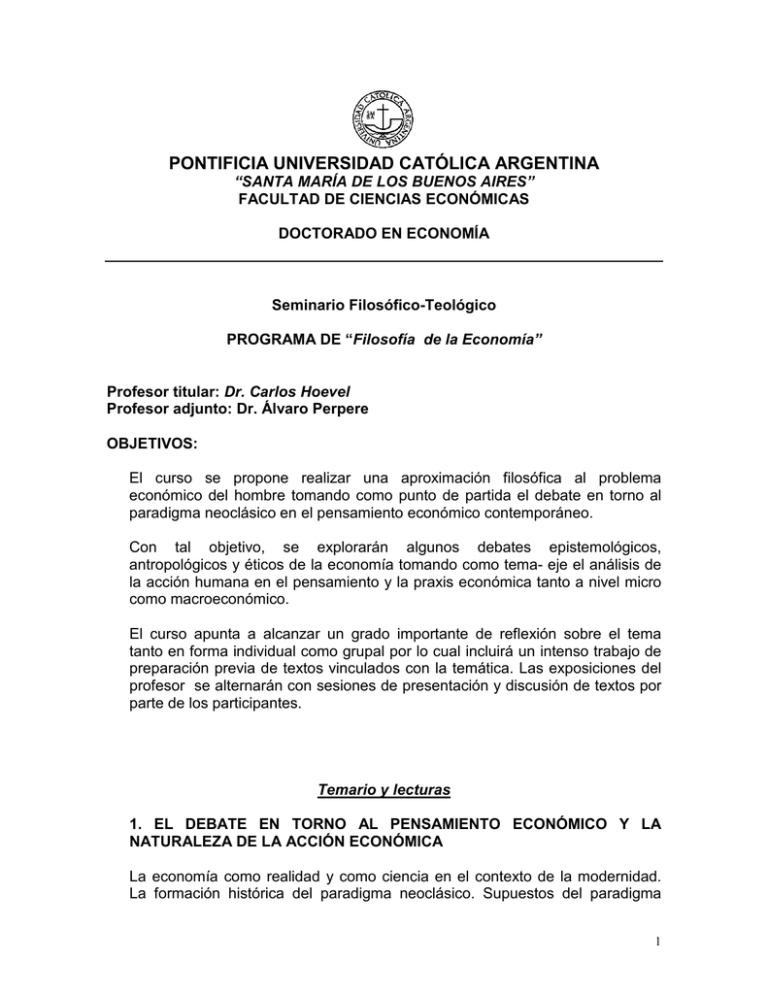
PONTIFICIA UNIVERSIDAD CATÓLICA ARGENTINA “SANTA MARÍA DE LOS BUENOS AIRES” FACULTAD DE CIENCIAS ECONÓMICAS DOCTORADO EN ECONOMÍA Seminario Filosófico-Teológico PROGRAMA DE “Filosofía de la Economía” Profesor titular: Dr. Carlos Hoevel Profesor adjunto: Dr. Álvaro Perpere OBJETIVOS: El curso se propone realizar una aproximación filosófica al problema económico del hombre tomando como punto de partida el debate en torno al paradigma neoclásico en el pensamiento económico contemporáneo. Con tal objetivo, se explorarán algunos debates epistemológicos, antropológicos y éticos de la economía tomando como tema- eje el análisis de la acción humana en el pensamiento y la praxis económica tanto a nivel micro como macroeconómico. El curso apunta a alcanzar un grado importante de reflexión sobre el tema tanto en forma individual como grupal por lo cual incluirá un intenso trabajo de preparación previa de textos vinculados con la temática. Las exposiciones del profesor se alternarán con sesiones de presentación y discusión de textos por parte de los participantes. Temario y lecturas 1. EL DEBATE EN TORNO AL PENSAMIENTO ECONÓMICO Y LA NATURALEZA DE LA ACCIÓN ECONÓMICA La economía como realidad y como ciencia en el contexto de la modernidad. La formación histórica del paradigma neoclásico. Supuestos del paradigma 1 neoclásico o “mainstream economics.” Maximización, racionalidad instrumental, preferencias exógenas, individualismo metodológico y competencia perfecta. Debates actuales dentro de la teoría neoclásica. Lecturas: Crespo 1997: 17-22; 115-144; 169-179; Weber 1969: 41-80; Cachanosky 1985: 2-27; Becker 1978: 3-14; Bowie 2004: 127-147; Wallacher 2004: 71-82; Melé 2004: 33-53. 2. EL MERCADO: ORÍGENES, NATURALEZA Y LÍMITES Orígenes históricos y concepciones acerca de la naturaleza del mercado: orden espontáneo, construcción estatal e institución civil. La dimensión ética y jurídica de las relaciones económicas. El debate sobre la extensión del mercado. Relaciones entre el mercado y los bienes morales y sociales. Lecturas: Smith 1983 (1776), libro I, capítulo 2; Polanyi 1957: 56-76; Hirschman 1992: 105-141; Friedman; T. 1999: 120-130; 131-162; Hayek 1945: 519-530; Zamagni 2006: 18-29, 37-56; Becker- Elías: 2007: 3-24; Anderson 1998: 223-249; Benedicto XVI 2010: c. III. 3. CONSUMO, NECESIDADES Y FELICIDAD El debate clásico sobre el consumo y las necesidades. La teoría neoclásica del consumo. Subjetividad de las preferencias. Los cuestionamientos desde la economía experimental. Psicología y ética del consumo. Subjetividad y objetividad de las necesidades. El círculo consumo - trabajo en la sociedad actual. La economía de la felicidad. Lecturas: Hume 1963 (1752) 36-75; Marx 1997 (1844): 103-119; BeckerStigler 1977: 76-90; Sen 1973: 241-259; Kahneman 2003: 162-168; Wilensky 1988: 21-46; Galbraith 1992 (1958): 139-157; Schor 1992: 107-165; Ansa Eceiza 2008: 1-22; Skidelsky & Skidelsky (2012), 96-123. 4. El EMPRESARIO, LA EMPRESA Y EL TRABAJO El empresario en la teoría económica. La teoría neoclásica de la empresa. El debate sobre la naturaleza y la responsabilidad social de la empresa. La teoría neoclásica del capital humano y el trabajo. Los cuestionamientos desde la economía experimental: motivación intrínseca y dimensión subjetiva del trabajo. 2 Lecturas: Baumol 1968: 64-71; Coase 1960: 1-44, 1937: 33-47; Kennedy 1981: 1-59; Friedman, M. 1970; Bell 1965: 22-32; Bowie 2004: 141-147; Becker 1962: 9-49. Frey-Jergen 2000: 1-25; Rost-Osterloh 2007: 132 5. GLOBALIZACIÓN, DEMOCRACIA Y CIENCIA ECONÓMICA El debate sobre la globalización. Globalización y democracia. Globalización financiera y desarrollo. Perspectivas ortodoxas y heterodoxas. Crisis de la globalización y ciencia económica. Lecturas: Hirschman 1977: 67-114; Smith 1776: libro III, capítulo 4; Keynes 1984 (1931): 272-294; Quan Li 2003: 29-54; Friedman M.1961: 1-10; Mishkin 2005: 1-45; Bhagwati 2002: 1-23; Reich 2007: 1-4; Rodrik 2007: 1-33, Posner 2010; Colander 2008: 1-18; Stiglitz 2001: 1-69; Koslowski 2011; Skidelsky, 2009. Las clases se dictan los viernes de 15:00 a 18:00 Abril: 5, 12, 19 y 26 Mayo: 3, 10, 17, 24 y 31 Junio: 7, 14 y 28 METODOLOGÍA: - El curso combinará clases expositivas, presentaciones individuales y sesiones generales de diálogo en conjunto. - Se requerirá la lectura obligatoria de los textos indicados previamente a cada encuentro. INSTANCIAS DE EVALUACIÓN: - Lecturas y presentaciones de los textos - Participación activa en las sesiones de diálogo general - Presentación de un ensayo final de 4.000 a 5.000 palabras sobre uno o más de los temas y textos trabajados durante el curso Referencias bibliográficas 3 AKERLOF, GEORGE A. & ROBERT J. SHILLER, 2010, Animal Spirits: How Human Psychology Drives the Economy, and Why It Matters for Global Capitalism, Princeton University Press, Princeton. ANDERSON, ELIZABETH, 1998, “The ethical limitations of the market”, en Economics, Ethics, and Public Policy, Rowman & Littlefiel Publishers, INC, Boston. ANSA ECEIZA, MAITE, “Economía y Felicidad: acerca de la relación entre bienestar material y bienestar subjetivo”, Depto. de Economía Aplicada 1. UPV/EHU. Donostia – San Sebastián, 2008. BAUMOL, W. “Entrepreneurship in Economic Theory”, The American Economic Review, Vol. 58, No. 2, (May, 1968). BHAGWATI, JAGDISH, 2002, “Coping with Anti-Globalization”, Unabbreviated version of the article in Foreign Affairs, January/February 2002. BECKER, GARY S., 1962, “Investment in Human Capital: A Theoretical Analysis”, The Journal of Political Economy, vol. 70, Nº5, part 2:Investment in Human Beings (Oct. 1962). BECKER, GARY S., 1978, The Economic Approach to Human Behavior, The University of Chicago Press, Chicago. BECKER, GARY S. Y ELÍAS, JULIO J., “Introducing Incentives in the Market for Live and Cadaveric Organ Donations”, The Journal of Economic Perspectives, vol.21, Nº3 (summer 2007). BECKER, GARY Y STIGLER, GEORGE, 1977, “De Gustibus non est disputandum”, en The American Economic Review, vol. 67, Nº2. BELL, DANIEL, 1989, Las contradicciones culturales del capitalismo, Alianza Universidad, México D.F. BELL, DANIEL, 1965, “The Corporation and Society in the 1970’”, The Public Interest. BELL, DANIEL Y KRISTOL, IRVING (comps.), 1983. La crisis en la teoría económica, Eds. El Cronista Comercial, Buenos Aires (The Crisis in Economic Theory, Basic Books, Nueva York, 1981). BENEDICTO XVI, 2010, CARTA ENCÍCLICA CARITAS IN VERITATE. BOWIE, NORMAN E., 2004, “Desafiando el Paradigma Egoísta”, en Ética de los Negocios, EDUCA; Buenos Aires. 4 BOWLES, SAMUEL, 1998, “Endogenous Preferences: The Cultural Consequences of Markets and other Economic Institutions, Journal of Economic Literature, Vol. XXXVI. BUCHANAN, JAMES, 1962, The Collected Works of James M. Buchanan, vol.3 “The Calculus of Consent, Logical Foundations of Constitutional Democracy”, Indianapolis, Liberty Fund, 1999. CACHANOSKY, JUAN CARLOS, 1985, “La ciencia económica vs. la economía matemática”, Revista Libertas, Instituto Universitario Eseade, Nº 3, octubre 1985. COASE, RONALD, 1988, “The Nature of the Firm”, Journal of Law and Economics, vol. 4. COASE, RONALD, 1960, The Problem of Social Cost”, Journal of Law and Economics, vol. 3. COLANDER, DAVID, et. al., 2008, “The Financial Crisis and the Systematic Failure of Academic Economics”, Discussion Papers, Department of Economics, University of Copenhagen. CRESPO, RICARDO F., 1997, La Economía como Ciencia Moral, EDUCA, Buenos Aires. FERULLO, HUGO, 2006, Luces y sombras del pensamiento económico moderno, Facultad de Ciencias Económicas de la Universidad Nacional de Tucumán. FRANK, ROBERT, 2001, Luxury Fever: Why Money Fails to Satisfy In An Era of Excess, Simon and Schuster, New York. FRIEDMAN, MILTON, 1970, “The Social Responsibility of Business is to Increase its Profits”, New York Times Magazine, September 13, 1970. FRIEDMAN, MILTON, 1961, “Capitalism and Freedom”, New Individualist Review, Liberty Fund. FRIEDMAN, THOMAS, 1999, Tradición versus innovación, Atlántida, Buenos Aires. FREY, BRUNO, 1997, Not just for the money: An economic theory of personal motivation. New York: Edward Elgar. FREY, BRUNO AND JERGEN, RETO, 2000, “Motivation Crowding Theory: a survey of empirical evidence”, Journal of Economic Surveys. GALBRAITH, JOHN KENNETH, 1958, La sociedad opulenta, Editorial Planeta, Buenos Aires, 1992. 5 HAHN, FRANK Y HOLLIS, MARTIN (eds.), 1986. Filosofía y teoría económica, FCE, Méjico (Philosophy and Economic Theory, Oxford University Press, 1979). HAUSMAN, DANIEL S. (ed.), 1994. The Philosophy of Economics. An Anthology, Cambridge University Press, 2nd. edn. HAYEK, F. A., 1945, “The Use of Knowledge in Society”, The American Economic Review, issue 4 (Sept. 1945) HAYEK, F. A., 1978, “Recuerdos personales de Keynes y ‘la Revolución Keynesiana’”, Nuevos Estudios, Eudeba, 1981. HIRSCHMAN, ALBERT O., 1992, Rival Views of Market Society and other recent essays, Harvard University Press, Cambridge. HIRSCHMAN, ALBERT O., 1977, The Passions and the Interests. Political Arguments for Capitalism before Its Triumph. Princeton University Press. HOEVEL, CARLOS, 2013, The Economy of Recognition. Person, Market and Society in Antonio Rosmini, Springer, Dordrecht Heidelberg New York London. HUME, DAVID, 1963 (1752), Ensayos Políticos, IEP, Madrid. KAHNEMAN, DANIEL, 2003, “A Psychological perspective on Economics”, en The American Economic Review, vol. 93, Nº2. KENNEDY, DUNCAN, 1981, “Cost-Benefit Analysis of Entitlement Problems: A Critique”, 33 Stan. L. Rev. 387 (1981). KEYNES, JOHN MAYNARD, (1931), 1984, The Collected Writings of John Maynard Keynes, Essays in Persuasion, vol.9, MacMillan, Cambridge University Press for the Royal Economic Society. KIRCHGÄSSNER, GEBHARD, 2008, Homo oeconomicus: The economic model of individual behavior and its applications in economics and other social sciences. The European heritage in economics and the social sciences, vol. 6. New York: Springer. KOSLOWSKI, PETER F. (ED.). 1985. Economics and philosophy. Tubinga: J. C. B.Mohr (Paul Siebeck). KOSLOWSKI, PETER, F., 2011, The Ethics of Banking: Conclusions from the Financial Crisis, Springer, Dordrecht Heidelberg New York London. MARX, KARL, 1997 (1844), Manuscritos: economía y filosofìa, Alianza, Madrid. 6 MELÉ, DOMÉNECH, 2004, “Racionalidad Ética en las Decisiones Empresariales”, en Ética de los Negocios, EDUCA; Buenos Aires MISHKIN, FREDERIC, 2005, “Is Financial Globalization Beneficial?” Lecture presented at the FDIC, Washington DC. POLANYI, KARL, 1957, The Great Transformation, Beacon Press, Boston. POSNER, RICHARD, 2009, A Failure of Capitalism: The Crisis of '08 and the Descent Into Depression, Harvard University Press, Cambridge. POSNER, RICHARD, 2010, The Crisis of Capitalist Democracy, Harvard University Press, Cambridge. QUAN LI AND RAFAEL REUVENY, 2003, “Globalization and Democracy: An Empirical Analysis”, British Journal of Political Science, Vol.33, Nº1. REICH, ROBERT, 2007, “How Capitalism is Killing Democracy” Foreing Policy, September/October 2007. Resico, Marcelo, 2009, La estructura de una economía humana, Educa, Bs. As. RODRIK, DANI, 2007, “How to Save Globalization from its Cheerleaders”, Harvard University, September 2007. ROST, KATJA AND OSTERLOH, MARGIT, 2007, “Management Fashion: Pay-forPerformance”, University of Zurich – Institute for Organization and Administrative Science, University of Zurich. SANDEL, MICHAEL, 2012, What Money Can't Buy: The Moral Limits of Markets, Penguin Books Limited, New York. SCITOVSKY, TIBOR, 1976, The joyless economy: The psychology of human satisfaction. Oxford: Oxford University Press. SEN, AMARTYA, 1973, Behaviour and the Concept of Preference, Economica, New Series, Vol. 40, No. 159 (Aug., 1973), pp. 241-259 1999, Sobre ética y economía, Alianza, Madrid. SCHOR, JULIET, 1992, The Overworked American, Basic Books, New York. SKIDELSKY, ROBERT, 2009, Keynes: The Return of the Master, PublicAffairs, New York. 7 Skidelsky, Robert & Skidelsky, Edward, 2012, How Much is Enough?: Money and the Good Life, Other Press, New York. SMITH, ADAM, 1983 (1776), La Riqueza de las Naciones, Hyspamérica, Buenos Aires. STUART MILL, JOHN, Autobiography, Chapter V, Liberty Fund WALLACHER, JOHANNES, 2004, “¿Despedida del homo oeconomicus?”, Communio, Año 11, N° 2, Buenos Aires. WEBER, MAX, 1905, La ética protestante y el espíritu del capitalismo, Barcelona, Ediciones Península, 1975. WILENSKY, ALBERTO, 1988, Marketing estratégico, Tesis, Buenos Aires. WINCH, PETER, 1990, Ciencia social y filosofía, Amorrortu, Buenos Aires. SCREPANTI, ERNESTO & STEFANO ZAMAGNI. 2005. An outline of the history of economic thought, Oxford: Oxford University Press. ZAMAGNI, STEFANO, 2006, Heterogeneidad motivacional y comportamiento económico, La perspectiva de la economía civil, Instituto de Investigaciones Económicas y Sociales “Francisco de Vitoria” ZAMAGNI, STEFANO, 2006, BRUNI, LUIGINO, 2007, Civil Economy: Efficiency, Equity, Public Happiness, Peter Lang. 8
